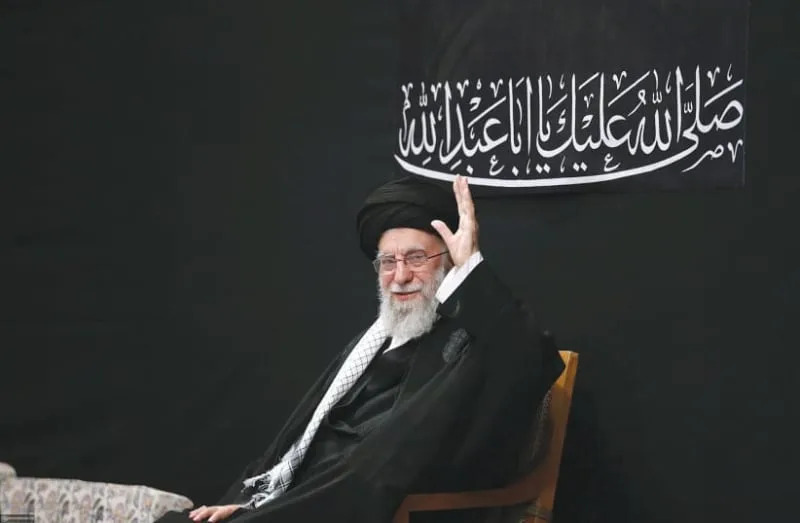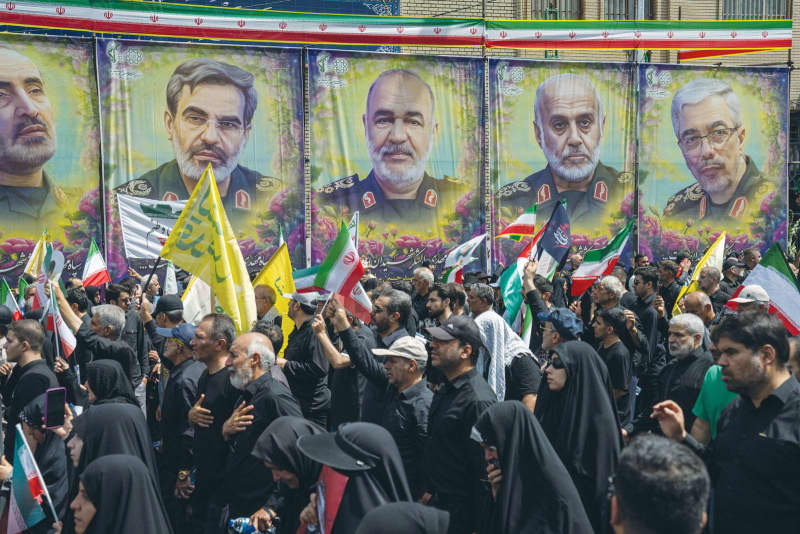IRAN AFFAIRS: A wounded tiger is a dangerous beast, and the IRGC, in claiming it was taking on the world, feels backed into a corner.
In the aftermath of the most direct and devastating confrontation between Israel and Iran in the history of the Islamic Republic, the ayatollahs in Tehran have traded silence for shouting. The missiles and planes may have stopped, but the regime’s war of words is just beginning, in a grand attempt to convince its own people that defeat was actually a victory.
For 12 days in June, Israeli drones and warplanes struck deep into Iranian territory. They demolished air-defense batteries, destroyed nuclear facilities, and assassinated senior officers of the Islamic Revolutionary Guard Corps. What Iran had long called unthinkable, war on its own soil, had become its new reality.
And then, silence.
Supreme Leader Ayatollah Ali Khamenei vanished from view. IRGC commanders went underground. Tehran’s propaganda outlets recycled boilerplate slogans, but the leadership said nothing of substance.
Now, weeks later, they are saying everything, and none of it is real.

AT THE end of June, Supreme Leader Ayatollah Ali Khamenei emerged from hiding and delivered a surreal speech, claiming ‘decisive victory’ over Israel and the United States. According to the ayatollah, the Zionist regime had been ‘crushed,’ and America ‘slapped in the face.’ (credit: Office of the Supreme Leader of Iran via Getty Images)
At the end of June, Khamenei emerged from hiding and delivered a surreal speech, claiming “decisive victory” over Israel and the United States. According to the ayatollah, the Zionist regime had been “crushed,” and America “slapped in the face.” A handful of retaliatory missiles fired at a US base in Qatar, which caused no known casualties, were presented as triumphs of strategic restraint and divine strength.
Yet in the real world, Iran’s skies had been ruled by Israeli drones. Its nuclear infrastructure was set back by years. Its air defenses were shattered. Its IRGC elite, including Quds Force commanders and senior scientists, were eliminated. What Khamenei portrayed as victory, the region witnessed as a stunning and humiliating exposure of Iran’s vulnerabilities.
Even more troubling was his absence during the war. Multiple credible reports revealed that the supreme leader had been moved to a secure underground facility, his location known to only a handful of aides. Electronic communications were severed. Senior Iranian officials reportedly didn’t know where he was or whether he remained fully briefed. When even insiders are asking who is in charge, it signals a regime in free fall.
‘We fought the world’
In recent days, regime voices have grown louder. IRGC spokesman Ali Mohammad Naeini warned that any future attack from Israel would be met with a “crushing” response, and that the “geography of the battlefield” would change.
“If the Zionist regime launches a new attack on the powerful and resilient Iran, the initiative to end the conflict will be in our hands,” Naeini said.
“We will not allow the sirens in the occupied territories to fall silent, and the enemy must not have the opportunity to leave its shelters,” Naeini stated. “They will experience more fleeing and displacement than they did during the 12-day war.”
Former IRGC chief Mohsen Rezaei declared that Iran would “wipe Israel off the face of the earth forever.” And interim chief of staff Habibollah Sayyari went one better: “People must understand that we did not fight just one regime… we fought NATO, Europe, and the United States. This is very important, yet we emerged from it with our heads held high.”
This is siege mentality of the highest order and an attempt to reframe a tactical and operational catastrophe as an epic showdown with global imperialism. By claiming to have fought “the world,” Iran seeks to elevate its loss into legend, and to insulate its leadership from accountability.
But that very narrative raises the obvious question: If Iran acquitted itself so honorably against the combined might of the West, why did it suffer so much so quickly?
The answer is simple. Despite years of building up arms and supplying proxies in the region, Tehran was never prepared for this war, and it showed.
Nowhere is Iran’s weakening grip more visible than in its own security apparatus. The IRGC, the regime’s enforcer since 1979, was built to protect clerical rule and crush dissent. Over four decades, it has grown into a military-industrial empire, dominating everything from oil to foreign policy. It is designated a terrorist organization by the US and serves as the spearhead of Tehran’s global ambitions.
But it has never faced a blow like this.
Israel eliminated key IRGC leaders in rapid succession, and such decapitating strikes on the IRGC’s upper echelons have left the organization reeling from top to bottom. This week at his Munich Conference, Reza Pahlavi, the exiled son of the last shah, claimed that thousands of state security personnel have already signed up to his campaign to bring democracy back to Iran.
“A large number of IRGC members are looking for a way to jump ship,” Pahlavi told those gathered.
It may be the most dangerous proposition the Islamic Republic has faced yet: defections.
History shows that regimes fall not when the public turns against them, but when the coercive institutions break ranks. And with the IRGC’s leadership gutted, its credibility shattered, and its soldiers increasingly disillusioned, the regime’s days may be numbered, if they choose to walk away.
There is precedent to Iran’s bluster. In 1988, the first supreme leader of Iran, Ayatollah Ruhollah Khomeini, likened the ceasefire to end the Iran-Iraq War to drinking poison. In 2020, after Qasem Soleimani’s assassination, Iran claimed symbolic strikes were sufficient revenge. And now, after a devastating defeat, the regime insists it has won.
This is the Islamic Republic’s pattern: deny, mythologize, and lash out. But each time, the audience shrinks and the myth fades faster. The people no longer believe in the regime.
Even among traditional allies, Iran found little support. China issued a few generic statements. Russia remained preoccupied with Ukraine. The Gulf states largely stayed silent.
In global forums, Iran’s narrative failed to gain traction. Tehran’s claim of “resistance” now looks more like an act of desperation from a regime unsure of its next move. But a regime that loses its grip on truth is dangerous. One that loses its grip on its own armed forces is more so.
Tehran may lash out in irrational ways. Cyberattacks, covert plots abroad, or asymmetric strikes in Africa or Latin America may all occur in response to the June war, and the threat has grown for Jews and Israelis abroad. The United States Commission on International Religious Freedom released a July update to its annual report stating that, “following the June 2025 regional military escalation, Iran has also escalated its targeting of Jewish sites and individuals abroad. In July, Danish authorities arrested a man recruited by Iranian intelligence authorities to gather information on possible attacks on Jewish targets in Germany. Days later, British authorities released a report detailing Iranian government efforts to activate proxy cells to kill or kidnap Jewish individuals in the country.
“Iranian authorities are also spreading antisemitism online and through official foreign media channels,” the update continued. “For example, the Islamic Republic of Iran Broadcasting network uses Spanish-language media to promote antisemitic myths and ideas, including Jewish power over Hollywood and Holocaust revisionism. Through IRIB’s PressTV and its Spanish-language counterpart, HispanTV, Iranian authorities are also pushing the ‘Plan Andinia’ conspiracy. This myth is anchored in the tropes of Jewish people hoarding power, money, and influence and plotting a ‘secret plan’ to establish a second Zionist state in the Patagonia region of Argentina and Chile.”
A wounded tiger is a dangerous beast, and the IRGC, in claiming it was taking on the world, feels backed into a corner. Deprived of legitimacy at home, abandoned by many allies abroad, and challenged by defections in its own ranks, the Islamic Republic may now seek revenge. When Tehran cannot project power with missiles, it will turn to proxies and assassins.
Because, it is important to remember, the Islamic Republic may be bloodied, but it is not yet dead.
